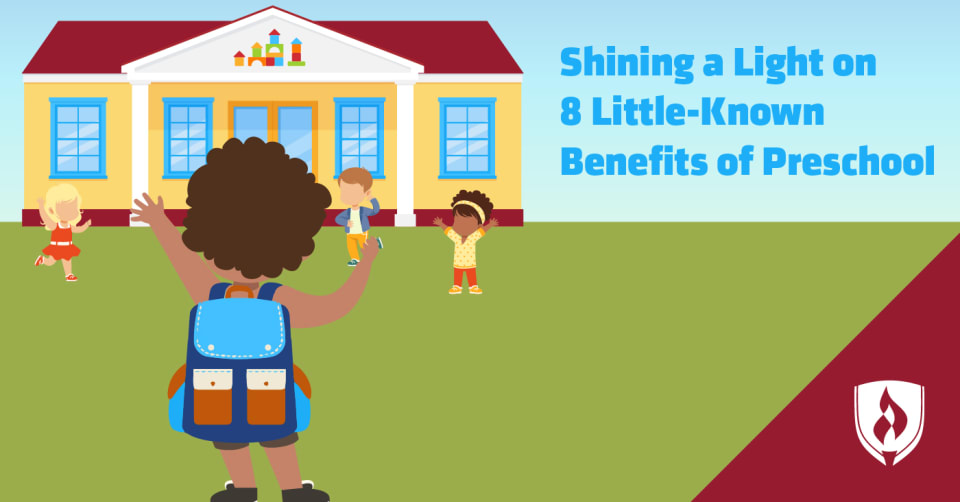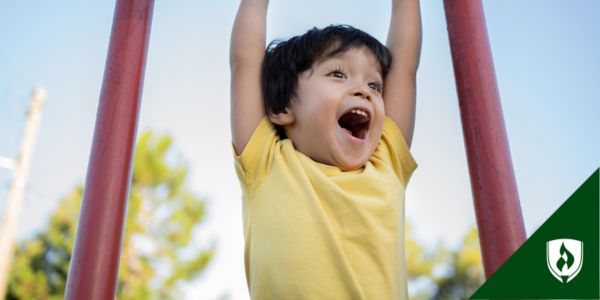
Starting kindergarten was a big deal when you were growing up, but now many kids are experiencing their first school milestone even earlier. Preschool programs for young children are becoming increasingly common, with 68 percent of four-year-olds and 40 percent of three-year-olds enrolled in a preschool program in 2017, according to the National Center for Education Statistics.1
You might think of preschool as an optional bonus for kids before they enter the “real” school system. But there are undeniable benefits of preschool that parents should consider when deciding whether these educational programs are right for their little ones.
“The human brain grows at an exponential rate between birth and age six,” says Dr. Jennifer Jones, founder of Green Ivy Schools. “Preschool is absolutely prime time to develop every aspect of your child for lasting lifetime results.”
Discover more about how preschool serves as the foundation for children’s learning with these little-known benefits of preschool.
8 Little-known benefits of preschool
Preschool offers many hidden benefits to children and their families, from encouraging healthy development to providing parents a more affordable alternative to day care. Read on to hear expert opinions about the many benefits of preschool!
1. Preschool teaches children to follow directions.
Every parent knows the frustration of repeating themselves over and over while their young child completely ignores them. What parents may not realize is that following directions is a skill that children hone over time—and preschool can help make this happen.
Elizabeth Malson, president of the Amslee Institute, shares that preschool gives kids additional opportunities to follow basic directions like when to line up or how to wash their hands. Even through these simple tasks, “children learn to listen to adults and view them as authority figures.”
2. Preschool helps children adjust to kindergarten.
It can be a big adjustment for a young child to navigate the workings of a classroom for the first time in kindergarten. Preschool programs, even those that are only part-time, can help kids make the transition.
“Exposure to school routines in preschool prepares them for the structure and expectation of kindergarten,” says school psychologist Dr. Ari Yares. In addition to seeing the basic rhythm of a school day, “children also learn hygiene routines like washing hands before eating and how to take care of their belongings in their cubby.”
3. Preschool establishes social and emotional development.
“Preschool is much more about developing social-emotional skills than it is about developing academic skills,” says Dr. Yares. These social-emotional skills include learning to share and take turns, showing empathy for classmates and self-regulating their own strong emotions. Without skills like these, children will have a hard time moving on to academic achievement in later years.
“Preschool provides a safe but challenging environment for children to learn how to manage the loss of a toy to another child during play or sit quietly and listen to a short story without interrupting,” Malson says. “These experiences help them explore different feelings and create the foundation for self-regulation.”
4. Publicly funded preschool can save parents money.
There’s no arguing with the fact that childcare in the United States is expensive. The Center for American Progress reports that it costs an average of $760 per month to send a preschooler to a licensed childcare center, an amount that puts many working parents in a financially tight spot.2
Preschool is an option that can help offset this cost while providing high-quality education to kids in their formative years. Head Start programs are available for free to families who meet income eligibility requirements. Many areas also offer free or low-cost preschools that are publicly funded. Preschool programs like these can add up to thousands of dollars of savings for parents who are currently funding full-time childcare.
5. Preschool provides opportunities for play.
Is play really a benefit of preschool? It might seem simple, but research shows that playful experiences prepare children for “deeper learning,” especially in essential skills like executive functioning.3 Preschool exposes children to many different types of play that they may not have access to at home.
“Ultimately, the greatest value of preschool is inherent in the power of play and exploration,” Dr. Jones says. “The early brain is insatiably curious, and quality preschools provide vast opportunities for children to have exposure to various subjects, the arts, creative processes and literature.”
6. Preschool encourages physical development.
Believe it or not, physical development directly impacts a child’s ability to learn. Fine motor skills are necessary for kids to hold a pencil and learn to write as they get older, and gross motor skills are the whole-body movements that allow kids to balance and coordinate their actions.
Preschool environments give kids what they need to make progress in these important physical developments, including plenty of time spent outdoors. “Preschool helps children make mind-body connections that not only develop these skills but boost their self-confidence as children feel physically capable and self-sufficient in their bodies,” Dr. Jones says.
7. Preschool can reduce the need for special education services.
Special education services are often available to children who aren’t achieving developmental milestones or performing at a rate comparable to their peers in the classroom. Though these services are an essential intervention for kids who need them, the research is clear that preschool can often prevent kids from falling behind in the first place.
A report from the U.S. Department of Education (DOE) states, “Children who attend high-quality preschool programs are less likely to utilize special education services or be retained in their grade, and are more likely to graduate from high school, go on to college, and succeed in their careers than those who have not attended high-quality preschool programs.”4
8. Preschool contributes to education equality.
Preschool makes a difference that goes far beyond individual children and their families. The same DOE report shows that access to high-quality preprimary education can be the key that unlocks education equality across races, geography and income.4
The report states that children who don’t have access to the benefits of preschool may begin kindergarten at a strong disadvantage in both academic and social-emotional skills. “For some children, starting out school from behind can trap them in a cycle of continuous catch-up in their learning,” according to the DOE. Grants and publicly funded preschool programs like Head Start are working to expand access to early education so that the benefits of preschool are available to all children across the nation.
Preschool is more than play
You can see that these surprising benefits of preschool extend far beyond giving kids the chance to play with their friends all day. These benefits of preschool are all thanks to supportive, trained preschool teachers who make learning come alive in their early childhood classrooms each day. Not sure what to look for when picking a school? Check out our article about what to look for in a preschool.
If you can’t get enough information about how young kids learn and develop, you might make a great preschool teacher yourself!
Related Articles:
- Anti-Bullying Lesson Plans: 6 Ideas for Early Childhood Educators
- What is a Child Life Specialist? Helping Kids Cope with Medical Crisis
1National Center for Education Statistics, The Condition of Education, Preschool and Kindergarten Enrollment, [accessed August 2019] https://nces.ed.gov/programs/coe/indicator/cfa/
2Center for American Progress, Understanding the True Cost of Child Care for Infants and Toddlers [accessed August 2019] https://www.americanprogress.org/issues/early-childhood/reports/2018/11/15/460970/understanding-true-cost-child-care-infants-toddlers/
3The LEGO Foundation, Learning Through Play: A Review of the Evidence, [accessed August 2019] https://www.legofoundation.com/media/1063/learning-through-play_web.pdf
4U.S. Department of Education, A Matter of Equity: Preschool in America, [accessed August 2019] https://www2.ed.gov/documents/early-learning/matter-equity-preschool-america.pdf
Graduates of Early Childhood Education programs at Rasmussen University are not eligible for licensure as a teacher in an elementary or secondary school. A Bachelor’s degree and a state teaching license are typically required to work as a teacher in a public school and some private school settings. States, municipalities, districts or individual schools may have more stringent licensing requirements. Students must determine the licensure requirements in the state and school in which they intend to work. Childcare facilities and the states in which they are located establish qualifications for staff who work with children, and often implement guidelines regarding age, education, experience and professional development. Students must determine the licensure requirements for the state and facilities in which they work. This program has not been approved by any state professional licensing body, and this program is not intended to lead to any state-issued professional license. For further information on professional licensing requirements, please contact the appropriate board or agency in your state of residence.




